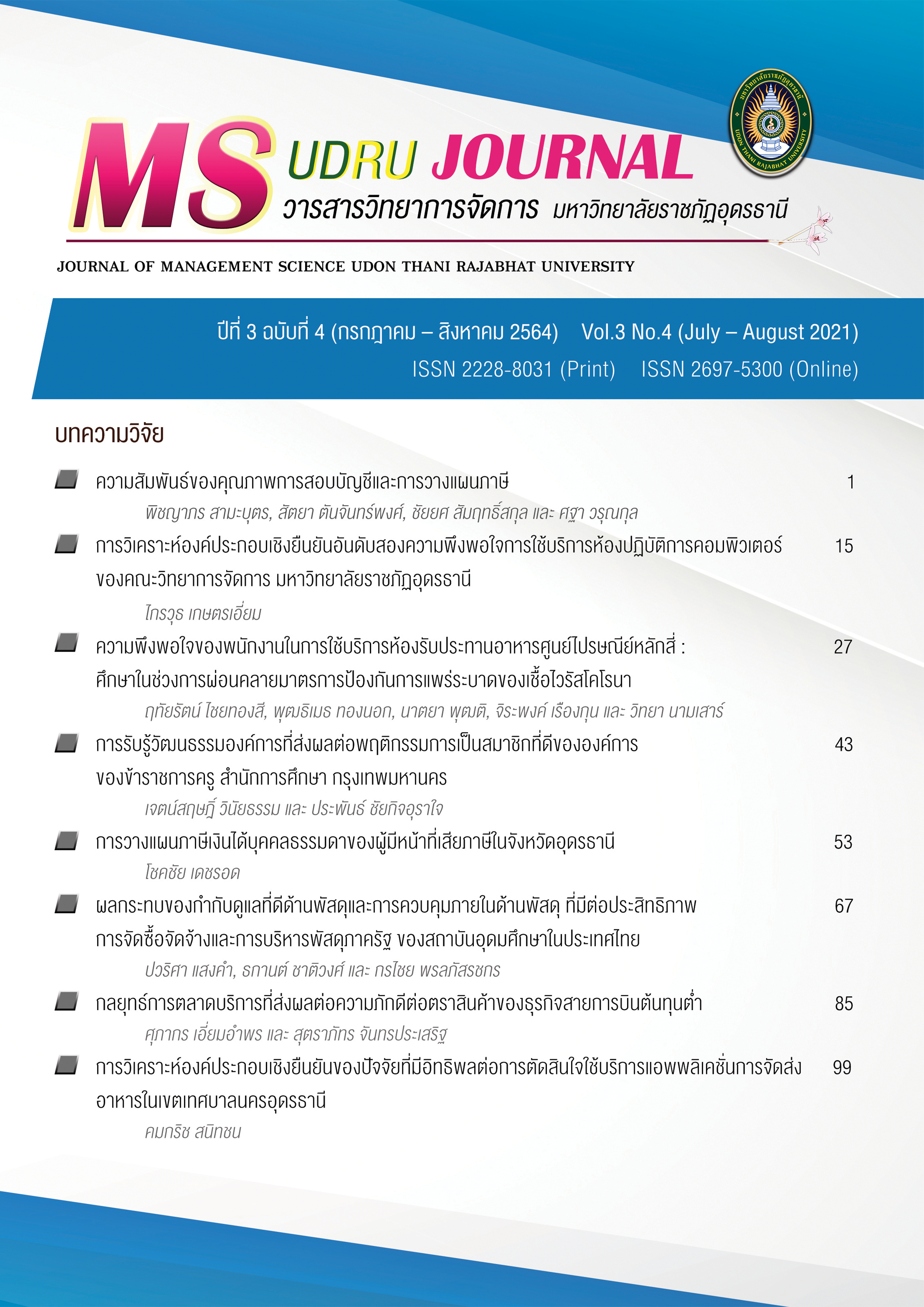EMPLOYEE SATISFACTION IN USING THE DINING ROOM SERVICE AT LAKSI POST CENTER: A STUDY ON THE DEREGULATION TO PREVENT THE SPREAD OF CORONAVIRUS
Main Article Content
Abstract
This research aimed to 1) study the level of employee satisfaction in using the dining room service at Lak Si Post Center during the deregulation to prevent the spread of the coronavirus and 2) compare the employee satisfaction in using the dining room service at Lak Si Post Center during the deregulation of the coronavirus epidemic prevention classified by gender, age, personnel type, and monthly income. Quantitative research was used. The data were collected by questionnaires from the sample groups of 258 Laksi Post Office staffs. Data were analyzed by frequency, percentage, mean, standard deviation, t-test and one-way ANOVA. The research results were found that the overall employee satisfaction using the dining room at Laksi Post Center was at a high level. When considering in each aspect; it was found that the merchants, place and environment were at high level. While the price, quality and service issues were at a moderate level. The results of the comparison of employee satisfaction in using the dining room at Laksi Post Office when classified by gender, age, type of personnel was found that there was no significant difference. While classified by monthly income, it was found there were the statistically significant differences at the 0.05 level in place and environment. The results are useful for improving the dining room service under the coronavirus outbreak situation.
Article Details

This work is licensed under a Creative Commons Attribution-NonCommercial-NoDerivatives 4.0 International License.
บทความที่ได้รับการตีพิมพ์เป็นลิขสิทธิ์ของคณะวิทยาการจัดการ มหาวิทยาลัยราชภัฏอุดรธานี
ข้อความที่ปรากฏในบทความแต่ละเรื่องในวารสารวิชาการเล่มนี้ ไม่ใช่ความคิดเห็นและความรับผิดชอบของผู้จัดทำ บรรณาธิการ กองบรรณาธิการ และคณะวิทยาการจัดการ มหาวิทยาลัยราชภัฏอุดรธานี ความรับผิดชอบด้านเนื้อหาและการตรวจร่างบทความแต่ละเรื่องเป็นความคิดเห็นของผู้เขียนบทความแต่ละท่าน
References
กลุ่มงานการเจ้าหน้าที่ ศูนย์ไปรษณีย์หลักสี่. (2559). สรุปความพึงพอใจของผู้ใช้บริการร้านอาหาร ศูนย์ไปรษณีย์หลักสี่. เอกสารอัดสำเนา.
กลุ่มงานการเจ้าหน้าที่ ศูนย์ไปรษณีย์หลักสี่. (2563). ข้อมูลบุคลากรศูนย์ไปรษณีย์หลักสี่. เอกสารอัดสำเนา.
จริยา ชื่นตา และประเสริฐ ศิริเสรีวรรณ. (2559) ความพึงพอใจของผู้ใช้บริการร้านอาหารธนาคารออมสินสำนักงานใหญ่. สืบค้นเมื่อ 3 ตุลาคม 2563, จาก http://utccmbaonline.com/ijbr/doc/(Edit)Id575-10-05-201722:04:17.pdf.
ธานินทร์ ศิลป์จารุ. (2553). การวิจัยและการวิเคราะห์ข้อมูลทางสถิติด้วย SPSS. กรุงเทพฯ : วีอินเตอร์ พรินท์.
พจน์ พจนพาณิชย์กุล. (2558). พฤติกรรมลูกค้ากับการให้บริการที่ใจ. สืบค้นเมื่อ 9 พฤศจิกายน 2563, จากฺ http://Sites.google.com/.site/potarticle/articles-1.
วรางคณา เรียงสุทธิ์ และลลนา อิลพัฒน์. (2561). ความพึงพอใจของนิสิตต่อการบริการโรงอาหาร มหาวิทยาลัยทักษิณ วิทยาเขตพัทลุง. วารสารมหาวิทยาลัยราชภัฏยะลา, 13(2), 263-274.
วิษณุ. (2563, 5 กันยายน). พนักงาน, กลุ่มงานสวัสดิการ ศูนย์ไปรษณีย์หลักสี่. สัมภาษณ์.
Alhelalat, J. A., Habiballah, M. A., & Twaissi, N. M. (2017). The impact of personal and functional aspects of restaurant employee service behavior on customer satisfaction. International Journal of Hospitality Management, 66, 46-53.
Bajarami, D. D., Terzic, A., Petrovic, M. D., Radovanovic, M., Tretiakova, T. N., & Hadoud, A. (2020). Will we have the same employees in hospitality after all? The impact of COVID-19 on employees’ work attitudes and turnover intention. International Journal of Hospitality Management, 94(2021), 102754.
Baron, S. L., Beard, S., Davis, L. K., Delp, L., Forst, L., Kidd-Taylor, A., Liebman, A. K., Linnan, L., Punnett, L., & Welch, L. S. (2014). Promoting integrated approaches to reducing health inequities among low-income workers: Applying a social ecological framework. American Journal of Industrial Medicine, 57(5), 539–556.
Bufquin, D., Park, J., Back, R. M., Meira, J. V. S., & Hight, S. K. (2021). Employee work status, mental health, substance use, and career turnover intentions: An examination of restaurant employees during COVID-19. International Journal of Hospitality Management. 93(2021), 102764.
Gagic, S., Tesanovic, D., & Jovicic, A. (2013). The vital components of restaurant quality that effect guest satisfaction. TURIZAM, 17(4), 166-176.
Mediros, C. O., & Salay, E. (2013). A review of food service selection factors important to the consumer. Food Public Health, 3(4), 176-190.
Parker, L. D. (2020). The COVID-19 office in transition: Cost efficiency and social responsibility business case. Accounting, Auditing & Accountability Journal, 33(8), 1943-1967.
Prin, M., & Bartels, K. (2020). Social distancing: Implications for the operating room in the face of COVID-19. Canadian Journal of Anesthesia. 7(2020), 789-797.
Ratten, V. (2020). Coronavirus (covid-19) and social value co-creation. International Journal of Sociology and Social Policy. Vol. ahead-of-print No. ahead-of-print.
Reeves, M., Lang, N., & Carlsson-Szlezak, P. (2020). Leading your business through the Coronavirus crisis. Harvard Business Review, February, 1-7.
Rogowska, A. M., Kusnierz, C., & Bokszanin, A. (2020). Examining anxiety, life satisfaction, general health, stress and coping styles during COVID-19 pandemic in Polish sample of university students. Psychology Research and Behavior Management, 13, 797-811.
Song, H. J., Yeon, J., & Lee, S. (2020). Impact of the COVID-19 pandamic: Evidence from the U.S. restaurant industry. International Journal of Hospitality Management, 92, 1-7.
Tuzovic, S., & Kabadayi, S. (2020). The influence of social distancing on employee well-being: A conceptual framework and research agenda. Journal of Service Management, Vol. ahead-of-print No. ahead-of-print.
Voorhees, C. M., Frobelle, P. W., & Bone, S. A. (2020). Don’t forget about the frontline employee during the COVID-19 pandemic: Preliminary insights and a research agenda on market shocks. Journal of Service Research, 23(4), 396-400.
Yamane, T. (1973). Statistics: An introductory analysis. 3rd edition. New York: Harper and Row.


